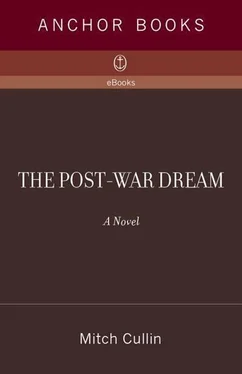“Hon, I don't know what on earth you're talking about.”
“I'm just trying to figure how we can get out of this mess we ‘re in. And I'm thinking maybe if we alter our evolutionary patterns as a society — if we do that, in a positive direction — it seems like our cells will follow along.”
“That's all well and good,” she said, “but that kind of evolution takes a long time, more time than I've been given, dear. More time than any of us have. It's a nice idea, though.”
“I prefer to consider it a concept,” he said. “A new concept, not really just an idea.”
“Well, you better write it down then, put it in your book.”
“You know, honestly, I feel like I'm onto something here. I believe it might be the key to solving this problem for the world, Deb.”
“You never know,” she said, grinning to herself.
“At least it's something, right?”
But soon another new concept came into play — the notion of living with cancer as opposed to dying from it. A bizarre definition for living, Hollis felt. How better, though, to provide the hopeless with hope than with a useful oxymoron. And so it was hope he clung to, as surely as it was hope which fueled Debra's determination. And, too, it was a kind of singular belief in herself as an individual — as someone apart from those also suffering with the disease — which gave her focus. Shrugging off Dr. Langford's advice, she had little interest in looking into organizations such as the Well-ness Community or Gilda's Club, in having her sickness treated like an analogue for the ovarian cancer of others. This was her fight, her life; she would manage.
“Who wants to be with a bunch of sick bald women anyway?” she balked, after Hollis mentioned he thought the support group named for comedienne Gilda Radner sounded encouraging. “Trust me, I don't need another thing to remind me I've got ovarian cancer. The chemo is bad enough.”
“You're right,” he said. “The chemo is bad enough.” So was the disease, he thinks now. So was the leaden, oppressive feeling which had consumed his gut — like holding his breath for months, like waiting for the other shoe to drop — and only relieved by a single refrain, those words Dr. Langford had spoken without expression: “We're not looking at a cure, just control. But there's still hope.”
Now scooping away the slush which has settled among the cacti, Hollis can feel the pull of better months; tending to his garden here — discarding what the cold night had dropped upon it — he can bring to mind more recent days, when the sun blazed high, the ground burned hot underfoot, and his skin was of a darker tint. Then he smiles at what presents itself to him: a commemorative American Legion National Convention pineapple-shaped decanter, a 1962 Southern Comfort turquoise-and-gold jigger measure, two vintage Fabulous Las Vegas shot glasses — all curios purchased by Lon while on their monthly pilgrimages into Tucson, intended for use and displayed inside the hut, each item having been found the previous summer at the Tanque Verde Swap Meet.
“How much you think it cost me?”
“I don't know. Five bucks?”
“Are you kidding? The guy wanted seven, but I got it for four.”
The swap-meet ritual became a kind of game, one in which the individual spending cap was twenty dollars (not including the steakhouse dinner which was always eaten prior to starting the return drive to Nine Springs). Parting ways, they had an hour and a half before rendezvousing again at the front entrance; during that time, both of them hunted rare deals to take home to their wives — antique picture frames, custom-made lampshades, collectable wall plates — with the month's winner determined by whatever was deemed the best buy for the least amount spent (the loser, then, required to pick up the dinner tab). Regardless of whether Hollis won a given month's hunt or not, he knew early on he had already discovered the greatest bargain the swap meet offered — something he didn't have to haggle over, something he couldn't carry home or claim as a victory purchase: a fifteen-minute, $6 massage from the expert hands of a blind Taiwanese masseur. So while Lon shopped elsewhere — exploring the dirt lanes of the swap meet, rummaging through milk crates — Hollis took a seat in Ah-Chun's little booth, waiting for his chance to stretch across the table.
Hollis had encountered Ah-Chun last May, when he observed the blind masseur sweeping the mat-covered floor around a massage table — tanned feet embraced by well-worn sandals, long gray-white hair tied into a pony-tail, taut weathered skin covering a skull which looked large in relation to the small body it sat upon — whisking bits of trash, creating a pile the man couldn't possibly see. Frank Sinatra's recording of “Send In the Clowns” began playing from the swap-meet loudspeakers, and Ah-Chun paused, clutching at the broom handle, apparently moved by the melancholy and defeat expressed in the song. Wearing a white smock which was big on his slight, compact frame, the man remained completely motionless for a moment, his eyes hidden behind sunglasses. Then Hollis noticed the cardboard sign propped against the booth, its handwritten message fashioned by a black Magic Marker, stating: TRUE BODY RUB, NO COMPARISON!
$4 ten minute / $6 fifteen minute / $8 twenty minute
RELAX BY GREAT BLIND MASSEUR ALL WAY FROM TAIPEI
That roughly made advertisement was enticing enough to lure Hollis onto the man's table — where, for ten glorious minutes, his skin and muscles were pulled, tugged, pounded, loosened. The following June he paid the fifteen-minute price, and those extra five minutes lulled him into a sublime, tranquil sleep which, after waking, left his body invigorated and limber for perhaps the first time since Debra's illness was discovered. It wasn't until July, however, that Hollis actually made an effort to learn about the blind man, asking his name and talking to him as one might do with a barber.
“How do you say it? Ash-hen?”
“Ah-Chun — ”
“At-ch-ung.”
“Ah-Chun — ”
“Ak-chun — like action?”
“No, is Ah-Chun — my name very easy, you see, not hard. Ah-Chun — ”
“Ah-shun — ”
“Maybe — it's closer — ”
Straining to comprehend the man's broken English, listening intently while pliant hands pressed against his spine, Hollis discovered Ah-Chun, like himself, had migrated to Southern California decades ago, and, as it happened, they had lived a few miles apart in neighboring San Gabriel Valley cities (Arcadia for Hollis and Debra, Rosemead for Ah-Chun and a now deceased wife).
“So how'd you end up way out here, Ah-Chun? What brought you to the Old Pueblo?”
He explained that his oldest daughter worked in Tucson for Raytheon Missile Systems. Another daughter was a university professor in Michigan — in Lansing — but the weather there was too cold for him. “I like hot,” he said.
“Makes two of us,” Hollis said, as Ah-Chun's fingertips changed course and slid toward the curves of his shoulder blades. “I've got a home out at the Nine Springs development.”
With that Ah-Chun's hands paused. “It's Nine Springs where you living now?” he said. “Someone really call it that?”
“Yeah, just north of here, past Oro Valley.”
The hands began moving again, and Ah-Chun spoke from above, mentioning that, in Chinese legend, another nine springs also existed, functioning as a gateway to the underworld. “Except no one wants to go there too long, you see.” Because, he said, agitated spirits occupied that nether region in limbo, seeking justice for whatever wrongs might have contributed to their deaths, and wouldn't leave until recompense was made on their behalf.
“How about that,” Hollis said. “And it's called Nine Springs, too?”
Читать дальше










![Theresa Cheung - The Dream Dictionary from A to Z [Revised edition] - The Ultimate A–Z to Interpret the Secrets of Your Dreams](/books/692092/theresa-cheung-the-dream-dictionary-from-a-to-z-r-thumb.webp)

